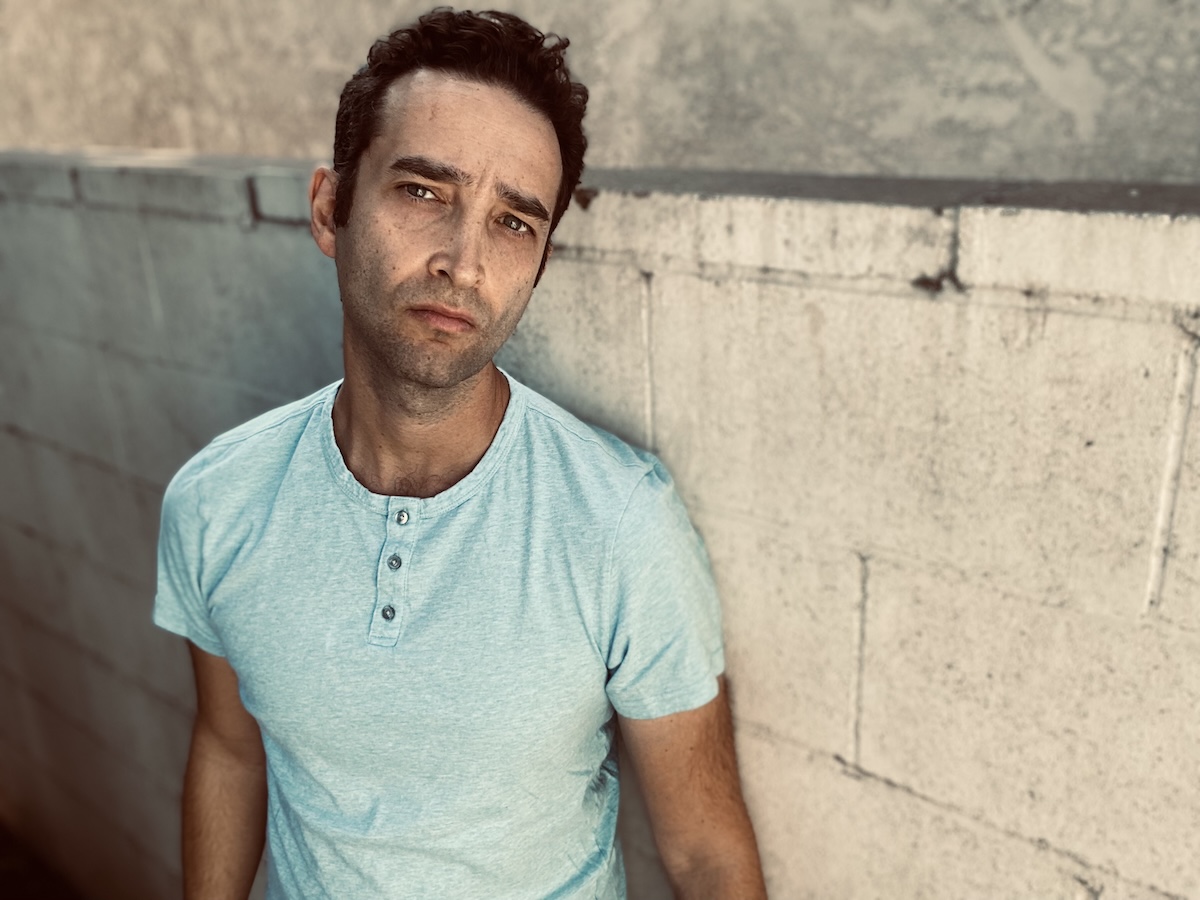Spencer Berger has that kind of look that makes you wonder where you’ve seen him before. His thick brows, kind blue eyes, slim face, and wily smile are the perfect composite of a frontman you could swear you just saw on the cover of a magazine, or maybe an actor in a movie you can’t place.
The comparison isn’t too much of a stretch. Before his current one-man music project Auditorium (the moniker symbolizing a room where any music could be played), one of Berger’s big breaks was Skills Like This, a movie he wrote the screenplay for and also starred in at just 27 years old. The bank heist caper won the audience award at SXSW in 2007 and led to a brief on-screen career.
Even before those credits, music projects put him in the spotlight. In the late ’80s, at the ripe age of 9, the native New Yorker was performing with the Metropolitan Opera Children’s Chorus. By 18, he fronted New York indie rock band the Jive Wheel with friends from Vassar College.
Suffice to say, Berger—now 40-something and living in L.A.—has worn many masks over the years. But on the pensive rocker “Halloween,” appropriately launched today, the multi-talent makes a great case for shedding them all.
Berger explains more about the song’s origins that go back 20-plus years, talks about the musical he’s working on, and spills about that one time he literally bumped into Luciano Pavarotti.
You first wrote and performed a version of “Halloween” when you were 18 with the Jive Wheel. Why did you want to revisit and unearth it now?
I had just started college, and I was wrestling with the idea of trying to be true to myself and knowing I was putting my authentic self out there as I’m meeting all these new people who I may be hiding parts of myself from out of fear or shame. At the time, I thought this was something that only people my age were wrestling with. Now that I’m much older, I’m still thinking about that. I was hearing the lyrics differently, in a way that they didn’t strike me when I was 18.
It feels like the idea of “masks” right now is really significant, whether people putting on a mask via a social media persona or people taking off a mask so we see who they really are.
It’s interesting how that happens, how you’ll be listening to a lyric in the context of a current event that will strike you. In another song of mine, “Fire Fire Ocean Liner,” the first line of that song is “Rock ‘n rollers. Raise your hands. The president wants to join your band. He’s only played for a year or two, but he’s already so much better than you.” I wrote that lyric when Obama was still president. But by the time I released it, Trump had become president. And suddenly the way that anybody was absorbing that lyric, including myself, changed.
“Halloween” has the characteristic moodiness and dramatic vocals that carry the vibe of most Auditorium songs. Does that come from your opera background?
When I first started being in bands, the very first thing that I became aware of was that my voice didn’t fit with my heroes. I was growing up in the ’90s. I was listening to Nirvana, Eddie Vedder. I was digging all those incredible rock voices that had a wonderful dirtiness to them. And I would try to make my voice sound like what I thought it should sound like. But when I was in college and introduced to Elliott Smith, it opened up a whole row of doors in my brain. I heard a voice that didn’t fit with what you would typically think of as rock and roll. There were also bands like Pulp; when I heard Jarvis Cocker’s voice, I was like, well, this guy’s pretty theatrical. Or Grant Lee Buffalo. Grant-Lee Phillips’ voice was another that struck me, like wow he’s really doing his own thing. So there were these artists along the way that sort of poked me and said, just stop trying to sound like anybody else, try to sound like yourself. The idea kind of goes back to the song “Halloween.” When I started doing that, I actually started to sound like myself for the first time, and I started to write differently too. I found that suddenly the music that was coming out of me was no longer trying to fit this other voice. It wasn’t trying to do anything other than just be myself. And it was incredibly freeing.
Going back to your opera roots, how does one even get started with the Metropolitan Opera Children’s Chorus and performing with Luciano Pavarotti and Placido Domingo?
I was growing up in Queens, and I used to sing around the house, but that was pretty much the extent of it. A family friend had heard me and encouraged my parents to have me audition because that was a thing in New York. If you’re growing up there, the operas need kids. The woman who auditioned me was the director of the Metropolitan Opera Children’s Chorus, this unbelievable human being by the name of Elena Doria. She passed away a few years ago. And if you look her up, you will read all sorts of legendary tales about her. When I auditioned, we traveled five stories underground because underneath the Metropolitan Opera is like a labyrinth. In this small room was a piano and a bunch of folding chairs and a blackboard, and Elena Doria sat down at the piano and said, ‘All right, kid, sing “Happy Birthday.” Singing happy birthday is an incredibly common thing when you don’t have anything prepared because of that octave in the middle of the song. Before I knew it, I was cast in La Boheme, and it couldn’t have been more than a month or two before I suddenly was on stage and there was Pavarotti. My experience with Pavarotti was that I was walking off stage and I walked into what honestly felt like a wall, and I kind of bounced back. But I looked up and it was not a wall, it was Pavarotti. And he didn’t even know. It was like he didn’t even notice that I touched him. He was completely unfazed.”

Do you have plans to get back into acting in the future?
I’m starting to dip my foot back into it. The last album that I made was Life Changer, which came out in 2023. The songs [like “Cedars-Sinai Cafeteria Breakdown”] came out of the fact that when my wife was pregnant, she developed a life-threatening condition called HELLP syndrome that came on in the final 27 hours before our first child was born. After that experience, it wasn’t like I had a big plan to write about it. It was more like the only lyrics that came out of my head were all somehow related. By the way, that story has the happiest ending ever, because my wife obviously survived. Our child was born totally healthy. My wife is totally healthy now. But it just left such an impression, and I’ve been writing a screenplay that is basically based on that experience. It’s a musical, with the foundation being the songs from Life Changer.
What lies ahead for Auditorium? And do you think you’ll expand it beyond a solo project?
I find the challenge of trying to record music by myself deeply rewarding, but that said, I love collaborating with other musicians when I perform Auditorium songs live— for instance, I often perform with my wife Daya Berger, who’s a fantastic bassist. And on the extreme flipside of Auditorium is the punk band I play in, 123Death, in which myself and the two other band members (Malcolm Sosa and Jeff Electric) write and record everything together. [As Auditorium], I’m working on a whole bunch of singles for this coming year, which I’m excited to share. I’ll probably be releasing a song every one to two months. It takes me a while to feel proud of an album as a whole before I release it, so I started doing the singles model last year. Just before “Halloween,” I released a track called “George Washington’s Last Will and Testament,” which is part of a group of songs that has started to slowly take shape.
Find Auditorium: https://linktr.ee/auditoriummusic



